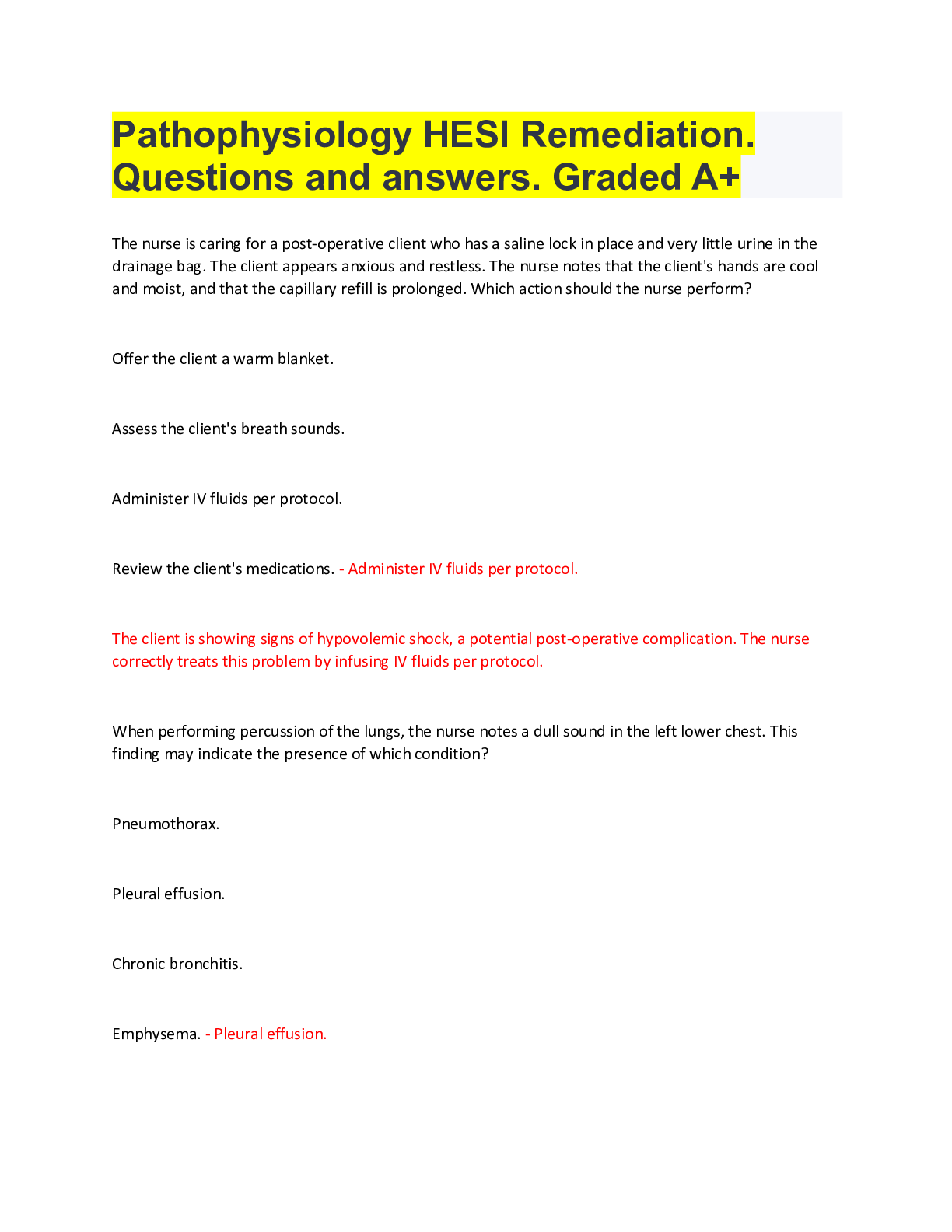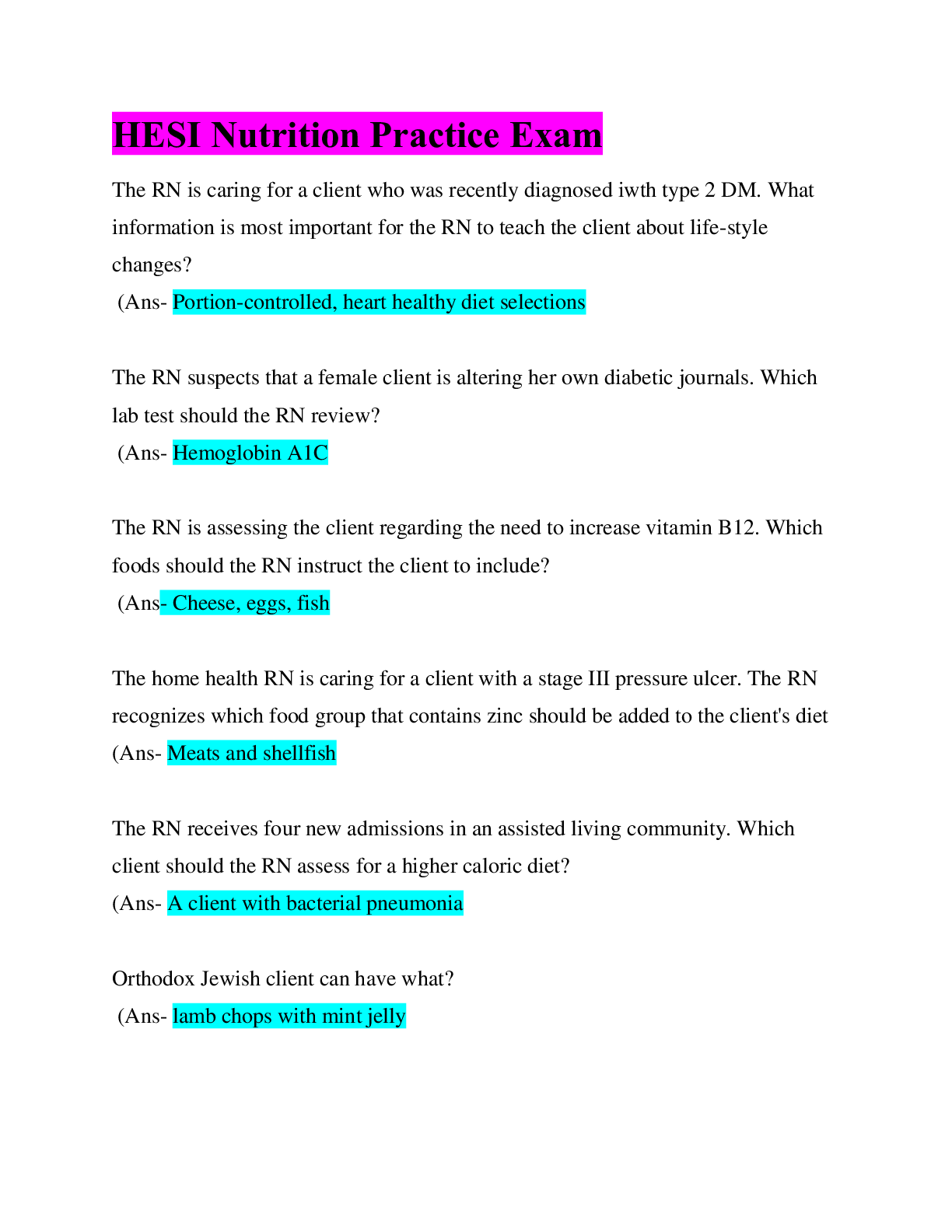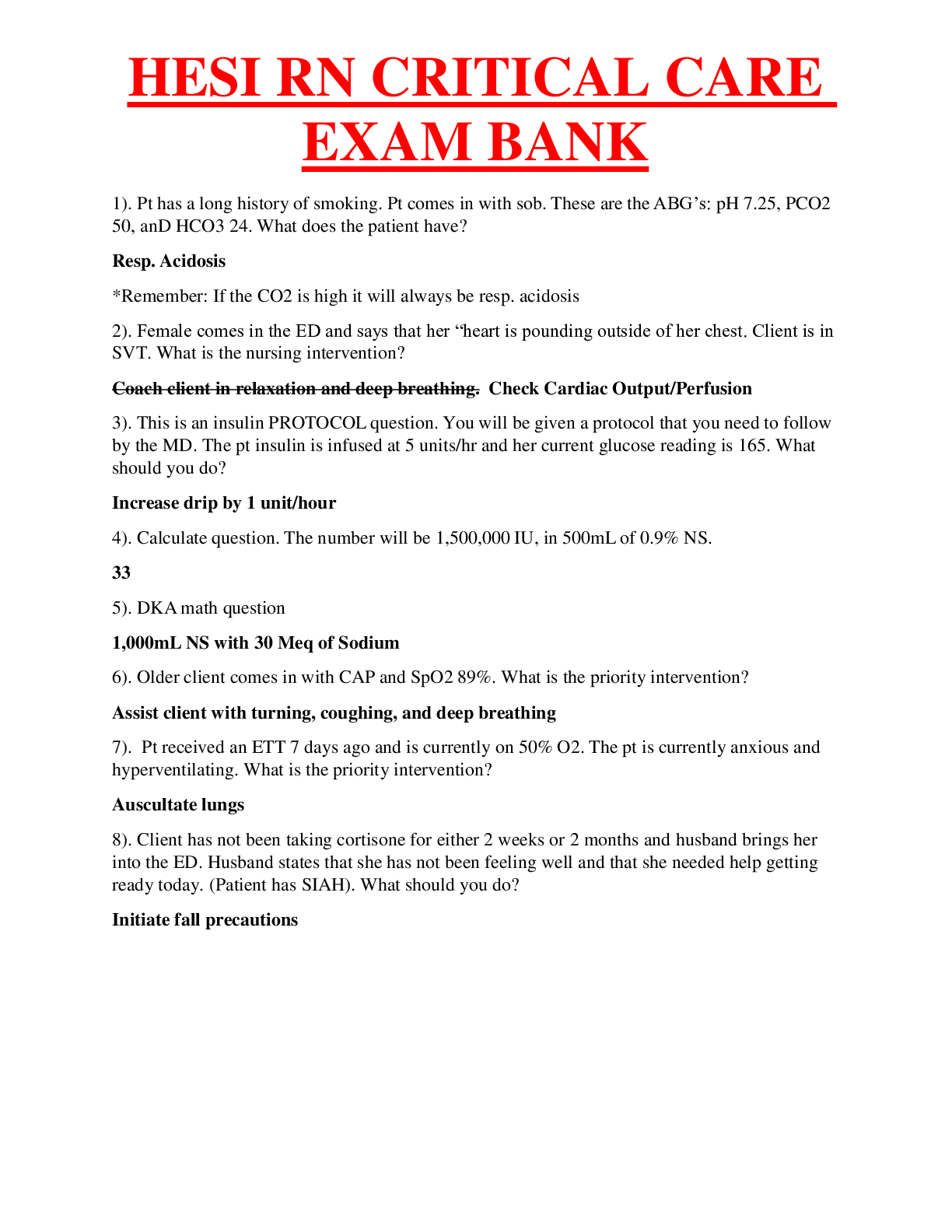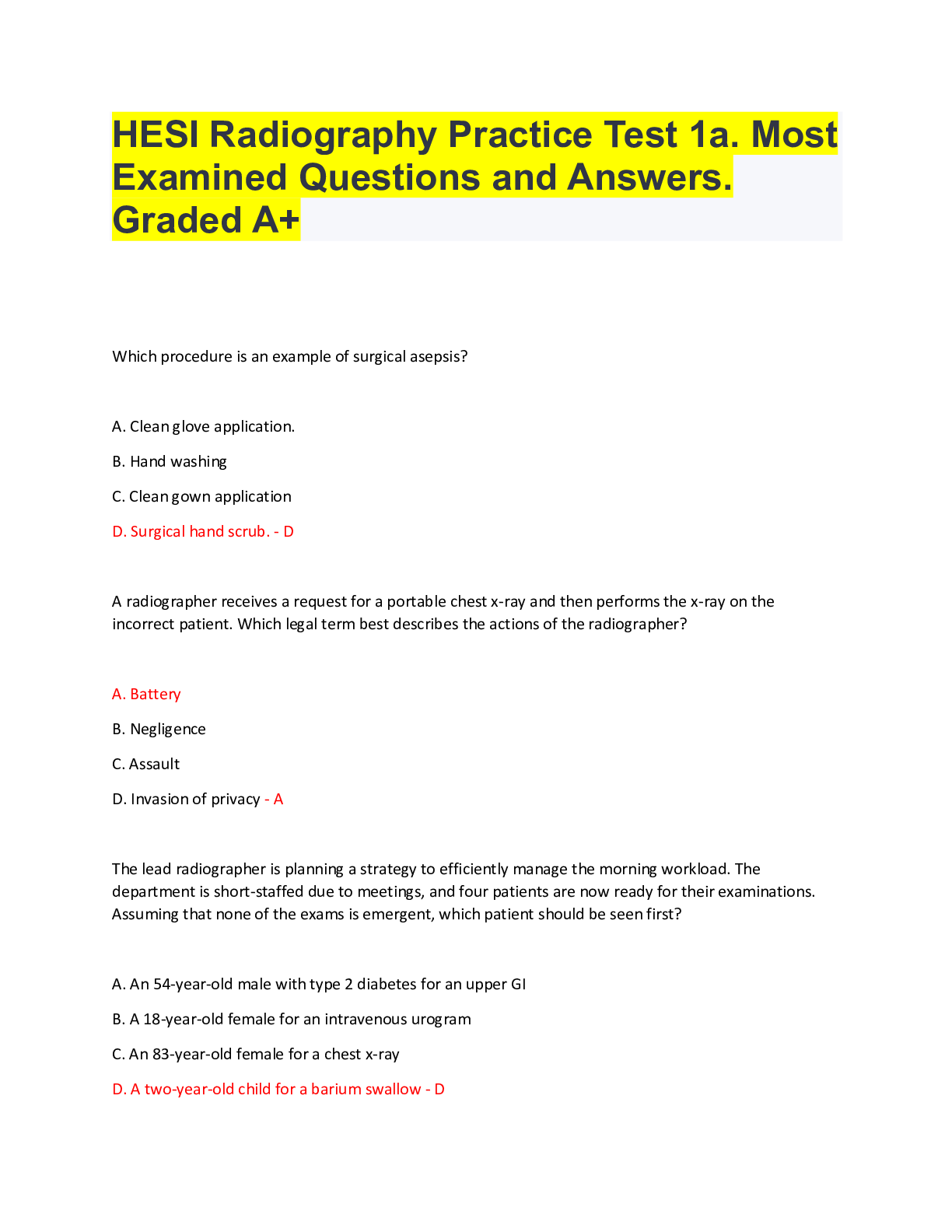Pathophysiology HESI Remediation. Questions and answers. Graded A+
Document Content and Description Below
The nurse is caring for a post-operative client who has a saline lock in place and very little urine in the drainage bag. The client appears anxious and restless. The nurse notes that the client's han... ds are cool and moist, and that the capillary refill is prolonged. Which action should the nurse perform? Offer the client a warm blanket. Assess the client's breath sounds. Administer IV fluids per protocol. Review the client's medications. - Administer IV fluids per protocol. The client is showing signs of hypovolemic shock, a potential post-operative complication. The nurse correctly treats this problem by infusing IV fluids per protocol. When performing percussion of the lungs, the nurse notes a dull sound in the left lower chest. This finding may indicate the presence of which condition? Pneumothorax. Pleural effusion. Chronic bronchitis. Emphysema. - Pleural effusion. Percussion is used to assess pulmonary resonance. A dull sound indicates the presence of solid tissue, such as the liver in the right lower chest, or an abnormal accumulation of fluid, such as an effusion. Which characteristic is typical of hypertensive crisis? Clinical evidence of flatten jugular vein. Development of a headache or blurred vision. Diastolic blood pressure less than 110 mm Hg. Elevated cardiac enzymes. - Development of a headache or blurred vision. Hypertensive crisis involves elevated blood pressure that can cause organ damage if the blood pressure is not brought down immediately. This condition rarely occurs, often is a result of clients not taking their hypertensive medications as prescribed. The nurse is caring for a client with a fractured left hip. During the admission assessment, the nurse notes petechiae and an increased heart rate. Which action should the nurse perform next? Observe the fracture site for ecchymosis. Obtain the client's blood pressure. Document the assessment findings. Assess the client's breath sounds. - Assess the client's breath sounds. A client with a fractured hip is at an increased risk for fat embolism syndrome (FES). The fat emboli can travel throughout the circulatory system and block capillaries (resulting in petechiae) or small vessels supplying vital organs, including the lungs. The nurse should assess the client's breath sounds to determine if emboli have traveled to the client's lungs. While assessing a pediatric client with cerebral palsy, the nurse notes that the child feels rigid and has significant arching of the back. Which action should the nurse take? Reposition the child to a lying position. Review the child's medication history. Document the assessment findings. Report the findings to the child's parents. - Document the assessment findings. Cerebral palsy is a permanent disorder that leads to abnormalities in movement, posture, and in some cases, intellectual functioning. Stiffness and arching of the back are normal findings in a client with cerebral palsy. The nurse should document the expected findings. The nurse is assessing an adult client for lung cancer. Which question should the nurse include in the client interview? "Are you coughing up yellow-green mucus?" "Do you have a history of night sweats?" "Are you experiencing shortness of breath?" "Have you experienced sudden crushing chest pain?" - "Are you experiencing shortness of breath?" When assessing a client for lung cancer, the nurse should ask if the client is experiencing shortness of breath. Dyspnea is the most common symptom in clients with lung cancer. The emergency department nurse is caring for a client with a severe head injury. Which sign indicates a potentially fatal complication? Intractable neck pain. Loss of memory. Complaints of dizziness. Positive halo sign. - Positive halo sign. A client with a severe head injury may be at risk for a skull fracture. The presence of a halo sign (nasal or ear drainage that leaves a yellow halo on filter paper) indicates that cerebrospinal fluid is leaking from the client's cranial cavity as a result of a skull fracture. This finding must be reported to the health care provider immediately. A client recently admitted with a diagnosis of appendicitis calls the nurse and states, "Do you think I'll still need surgery? My pain suddenly stopped, and I feel much more comfortable now when I bend my knees." Which intervention should the nurse perform? Review the client's medications. Prepare the client for emergency surgery. Assess the client's pain level. Position the client in high Fowler's. - Prepare the client for emergency surgery. Appendicitis, or inflammation of the appendix, may place the client at risk for rupture and perforation. Sudden pain resolution in a client with appendicitis is a sign of a perforated appendix and is a medical emergency. The nurse must notify the health care provider of the findings immediately and expect to prepare the client for emergency surgery. What are the physiological effects of high levels of cortisol released in response to prolonged exposure to stress? Decrease in the body's immune system response. Increase in skeletal muscle mass and strength. Weight loss and low levels of circulating serum glucose. Development of gastric ulcers and irritable bowel syndrome. - Decrease in the body's immune system response. Development of gastric ulcers and irritable bowel syndrome. The immune system and GI tract are affected. Long term presence of high levels of cortisol, which are produced by the stress response, suppresses the inflammatory process, decreases the production of white blood cells, and can lead to atrophy of immune system organs/tissues. The nurse instructs a client diagnosed with a sexually transmitted disease (STD) to take sitz baths three to four times a day, increase fluid intake, and apply local anesthetic sprays. This self-care regimen is recommended for which type of sexually transmitted disease? Trichomonas vaginalis. Chlamydia. Candida. Genital herpes. - Genital herpes. Symptoms of genital herpes include outbreaks of vesicles in the genital area; these vesicles eventually rupture, leaving painful ulcerations. Self-care of such outbreaks may include sitz baths three to four times a day, application of local anesthetic sprays, and increased fluid intake to replenish fluid lost through open lesions. The nurse is providing information about diclofenac sodium (Voltaren gel) to client with arthritis. Which instruction should the nurse include? Cover with a bandage after applying. Avoid sun and ultraviolet light exposure. Use with a heating pad to improve results. Use aseptic technique during application. - Avoid sun and ultraviolet light exposure. Diclofenac sodium (Voltaren gel) is a topical nonsteroidal anti-inflammatory drug used to treat joint pain. Voltaren causes increased sensitivity to light, so the nurse should advise clients taking this medication to avoid UV light exposure. A client is diagnosed with benign prostatic hypertrophy (BPH) on the basis of their history, physical examination, and urinalysis results. While reviewing the client's urinalysis results, the nurse becomes concerned about which finding? White blood cells. Pale urine. Specific gravity of 1.025. Negative for nitrites. - White blood cells. A hypertrophic prostate can obstruct the urethra and impede the client's ability to void normally. The client is at risk for urinary retention, which may lead to a urinary tract infection (UTI). The presence of white blood cells in the urine may be indicative of a urinary tract infection (UTI). Which should the nurse include when planning discharge education for a client with end-stage renal disease? Increase dietary protein intake. Increase fluid intake. Monitor blood pressure and weight. Monitor 24-hour urine intake and output. - Monitor blood pressure and weight. Maintaining blood pressure conserves existing kidney function and slows down the progression of end-stage renal disease (ESRD). Fluid overload, a complication of ESRD, is reflected by a weight gain. Daily monitoring of blood pressure and body weight is the best way to obtain accurate data to monitor for problems. Which statement is true regarding the effects of aging on glomerular filtration rate (GFR)? GFR declines due to age-related metabolic needs. GFR increases due to slight blood pressure increases caused by aging. GFR declines due to a loss of renal cortical tissue caused by aging. GFR increases due to age-related changes in the renal tubules. - GFR declines due to a loss of renal cortical tissue caused by aging. Aging is associated with a decline in renal function. One age-related factor that causes a decline in glomerular filtration rate is a decrease in renal cortical mass. [Show More]
Last updated: 2 years ago
Preview 1 out of 19 pages

Buy this document to get the full access instantly
Instant Download Access after purchase
Buy NowInstant download
We Accept:

Reviews( 0 )
$12.00
Can't find what you want? Try our AI powered Search
Document information
Connected school, study & course
About the document
Uploaded On
Mar 28, 2022
Number of pages
19
Written in
Seller

Reviews Received
Additional information
This document has been written for:
Uploaded
Mar 28, 2022
Downloads
0
Views
94






















